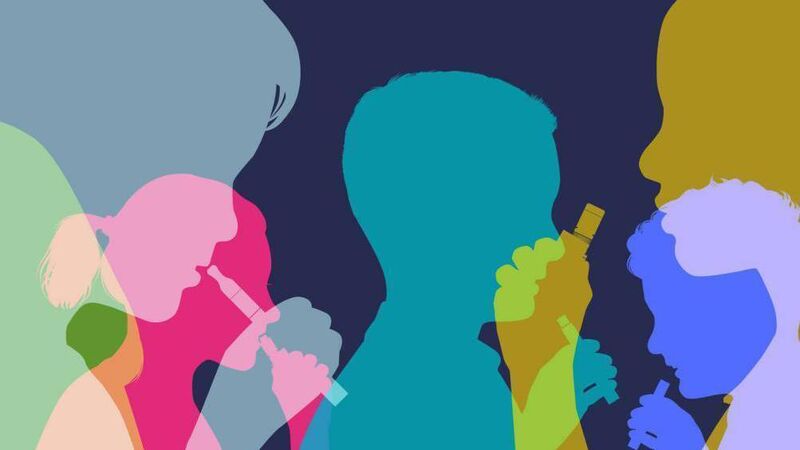Cork Views: Why we need new laws on vaping NOW

Young people who vape today have been compared to ‘guinea pigs’ who smoked in the 1950s and ‘60s
New evidence confirms that children who vape are three times more likely to go on to become smokers. The study found links to abuse of both alcohol and cannabis as well as higher risk of asthma and mental health problems.
An umbrella review of all existing available reviews on youth vaping – which included 56 reviews and 384 studies - was performed by researchers at the University of York and London School of Hygiene and Tropical Medicine.
It found vapers were more likely to smoke more frequently and intensely, to develop breathing problems including pneumonia and bronchitis, as well as lower sperm counts, dizziness, headaches, migraines, and mental health problems including depression and suicidal ideation.
Senior author of the study, Dr Rebecca Glover said vaping is having a detrimental impact on the health of young people and appears to be a gateway to other substances.
“Our study provides the strongest evidence to date that young people globally face a range of physical and psychological harms from vaping and are at higher risk of transitioning to smoking,” she said.
This comprehensive research paper published in Tobacco Control cements the mounting evidence that marketing of vapes to children is always unacceptable and shows why robust restrictions on the tobacco industry who control the vaping market are so important.
While legislation has been introduced in Ireland to restrict the sale of vapes to under 18s, the reality is compliance with the law is poor. Added to that, extension of the legislation that restricts the sale and marketing of tobacco products, to include similar restrictions on the sale and marketing of vapes, has yet to be implemented. Under the law, a person can be fined up to €4,000, as well as facing up to six months imprisonment.
In 2024, the HSE’s National Environmental Health Service conducted 389 test purchase inspections. Of those, 52 (13%) were found to be non-compliant – where one of these products was sold to a child. Of the 52 non-compliant cases in 2024, 12 resulted in a conviction with a fine, and the probation act was applied in six cases.
In the first six months of 2025, 50 out of 310 inspections (16%) were found to be non-compliant.
A fraction of cases is resulting in prosecution, reflecting the ambiguity that surrounds the health effects of vaping. The law is only of use if it is enforced. Until it is robustly applied the significant risk of potentially serious and lifelong impacts of vaping on a whole generation of young people will continue.
The explosion of vaping in the last decade is welcomed by the tobacco industry because it creates a new stream of revenue, given it’s estimated to be worth €22 billion worldwide.
E-cigarette use among children in Ireland
The latest data from 2022 shows that among 15- and 16-year-olds, 39% had tried vapes and 18% were current users. Among 12- to 17-year-olds, 19% ever used vapes. Usage was higher than cigarette use. According to the Growing Up in Ireland longitudinal study, almost one in ten 13-year-olds had ever used a vape.
Health effects
E-cigarette aerosol is not harmless water vapour. It contains nicotine; ultra fine particles that go deep into the lungs; cancer causing chemicals; flavourings such as diacetyl; a chemical linked to serious lung disease; and heavy metals such as nickel, tin and lead. The UK Royal College of Paediatrics has talked of the dangers of vaping for lung development. The World Health Organisation has warned of the impact of vaping on child brain development. The Royal College of Surgeons in Ireland conducted a toxicological analysis of flavours in vapes using AI technology, concluding that when heated, many hazardous chemicals were formed, including 127 classified as ‘acute toxic’, 153 as ‘health hazards’ and 225 as ‘irritants’.
As happened historically with cigarettes and more recently with alcohol labelling, industry motives for profit conflict with government objectives to limit access to vaping among young people. In the past, vapes were deliberately marketed to younger people via online promotion on TikTok, Instagram and Snapchat, while products are created that are cheap and appealing to young people with childlike flavours such as bubblegum.
Professor and Chair of Public Health at the University of Edinburgh, Devi Sridhar in How Not To Die (Too Soon) compared young people who vape to “guinea pigs... like the smokers in the ’50s and ’60s”.
Legislation
Restriction on the sale and marketing of tobacco products is due to be extended to vapes as part of legislation to be introduced by Minister for Health Jennifer Carroll McNeill.
The Public Health (Nicotine Inhaling Products) Bill will require shops to hide vapes in the same way they do for tobacco so that they are out of sight where children are present.
The legislation will include restrictions on the use of colours and imagery on devices, and introduce an advertising ban in all retail premises where vapes are sold. It will prohibit the sale of single use vapes and ban devices which resemble toys or games. The Bill will significantly restrict the flavours available.
From February, 2026, retailers will have to apply annually for a licence to sell vapes and there will be increased penalties for offenders, including minimum licence suspension periods and revocation of the licence entirely for retailers who commit two or more serious offences, such as selling to a minor.
The legislation will also prohibit the sale of tobacco and nicotine inhaling products from self-service vending machines and events aimed at children, and licences will not be granted to places like festivals.
This legislation has the capacity to be both comprehensive and robust, protecting minors from potentially life-long impacts of vaping. But laws are only effective when enforced.
New restrictions around marketing and sales of vapes are now an urgent priority. As with cigarettes, a population’s vaping rates are heavily shaped by policies put in place by government to make it both harder to smoke or vape and easier to quit.
Dr Catherine Conlon is a public health doctor in Cork.







 App?
App?




